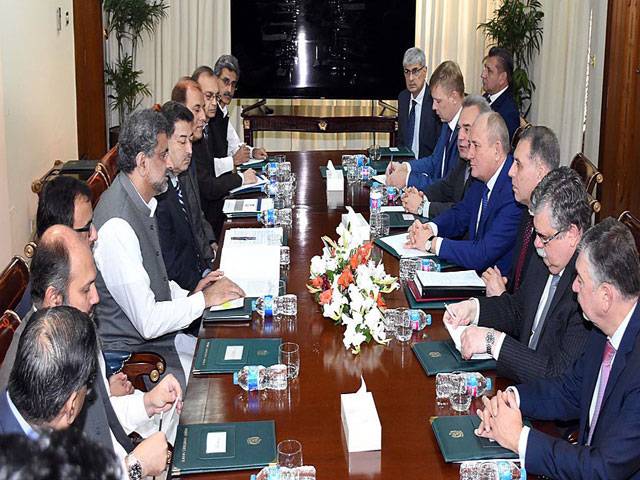ISLAMABAD - Prime Minister Shahid Khaqan Abbasi on Friday witnessed the signing of inter-governmental agreement between Pakistan and Russia for supply of gas.
The government was focusing on meeting the country’s energy requirements with particular focus on a balanced mix of energy resources, he said while warmly welcoming the Russian Deputy Minister of Energy Yury P Sentyurin on his visit to Pakistan. He said that Pakistan–Russia cooperation in various sectors is a step towards strengthening of bilateral relations. He said that the government is focusing on meeting the country’s energy requirements with particular focus on a balanced mix of energy sources.
The prime minister appreciated the delegation’s fruitful interaction with the Ministry of Energy. He expressed the hope that members of the Russian delegation will have a productive visit in the backdrop of briefing by various ministries about immense potential for investment in Pakistan’s infrastructure development, energy and communication sectors. He said that the economic outlook of Pakistan has altogether changed in the last four years, which is being acknowledged globally.
“Our investment policy has been designed to provide a comprehensive framework for creating a conducive business environment for the attraction of FDI,” the prime minister said. Pakistan's policy trends have been consistent, with liberalisation, de-regulation, privatisation, and facilitation being its foremost cornerstone, he added.
Minister In-Charge for Power Owais Legahri, Minister of State for Petroleum, Jam Kamal Khan and Ambassador of Russia to Pakistan Alexey Y Dedov was also present during the meeting.
Meanwhile, Prime Minister Shahid Khaqan Abbasi Friday reiterated the government’s commitment to continue undertaking all possible measures including policy initiatives to create an enabling environment for the businesses to grow and making the country's products more competitive in the international market.
The prime minister expressed these views in a meeting with a delegation of All Pakistan Textile Mills Association (APTMA) here at the PM’s Office. Finance Minister Muhammad Ishaq Dar, Commerce Minister Pervaiz Malik, Special Assistant to PM (SAPM) Haroon Akhter, SAPM Miftah Ismail and senior officers of the relevant divisions were also present during the meeting.
The delegation thanked the prime minister for revision and enhancement of Prime Minister’s Export Package which aimed at facilitating exporters to explore traditional as well as non-traditional markets around the world.
The delegation lauded the efforts of the government for ensuring energy security in the country especially for the industrial consumers. The delegation also presented various proposals aimed at increasing exports and thereby reducing trade deficit of the country.
While responding to the proposals, the Prime Minister observed that the government was prepared to work on any proposal which can ensure a tangible increase in exports and which provides for twin advantages of reducing trade deficit and increasing employment. The prime minister directed the minister of commerce to sit with the exporters and come back to him with firm recommendations based on empirical evidence.
Meanwhile, APTMA has said that Prime Minister Khaqan Abbasi has promised to address all issues raised by All Pakistan Textile Mills association,
During the meeting, APTMA delegation apprised Abbasi that export oriented textile industry is burdened with Rs.3.53/kWh on account of various surcharges, cross subsidies and system inefficiencies of theft and lesser billing collections on electricity.
Due to additional surcharges on gas including GIDC/UFG and heavy cost of supply, the local products become expensive to international buyers.
The association demanded that electricity tariff should not be more than Rs.7/kWh and RLNG and system gas should be provided at uniform price to industrial consumers both for captive and processing use across the country @ 600/mmbtu.
“FBR should liquidate all refund claims against which RPOS have been issued up to 30th Sept 2017 and expedite processing of all pending claims at field formation levels. Mechanism be put in place for monthly payments for new RPO’s in future,” they said.
They demanded a mechanism to provide duty drawbacks on locally manufactured raw materials to support the entire value chain.
LTFF facility be also allowed for building of infrastructure for garment plants. This will encourage investment initiatives for garmenting projects, they added.
Textile industry envisages undertaking new investment initiatives to create exportable surplus. The representatives suggested that the exports can be increased by revival of closed capacity valuing $4 billion of export potential. They said up to $12 billion exports could be increased by converting basic textiles into garments.






